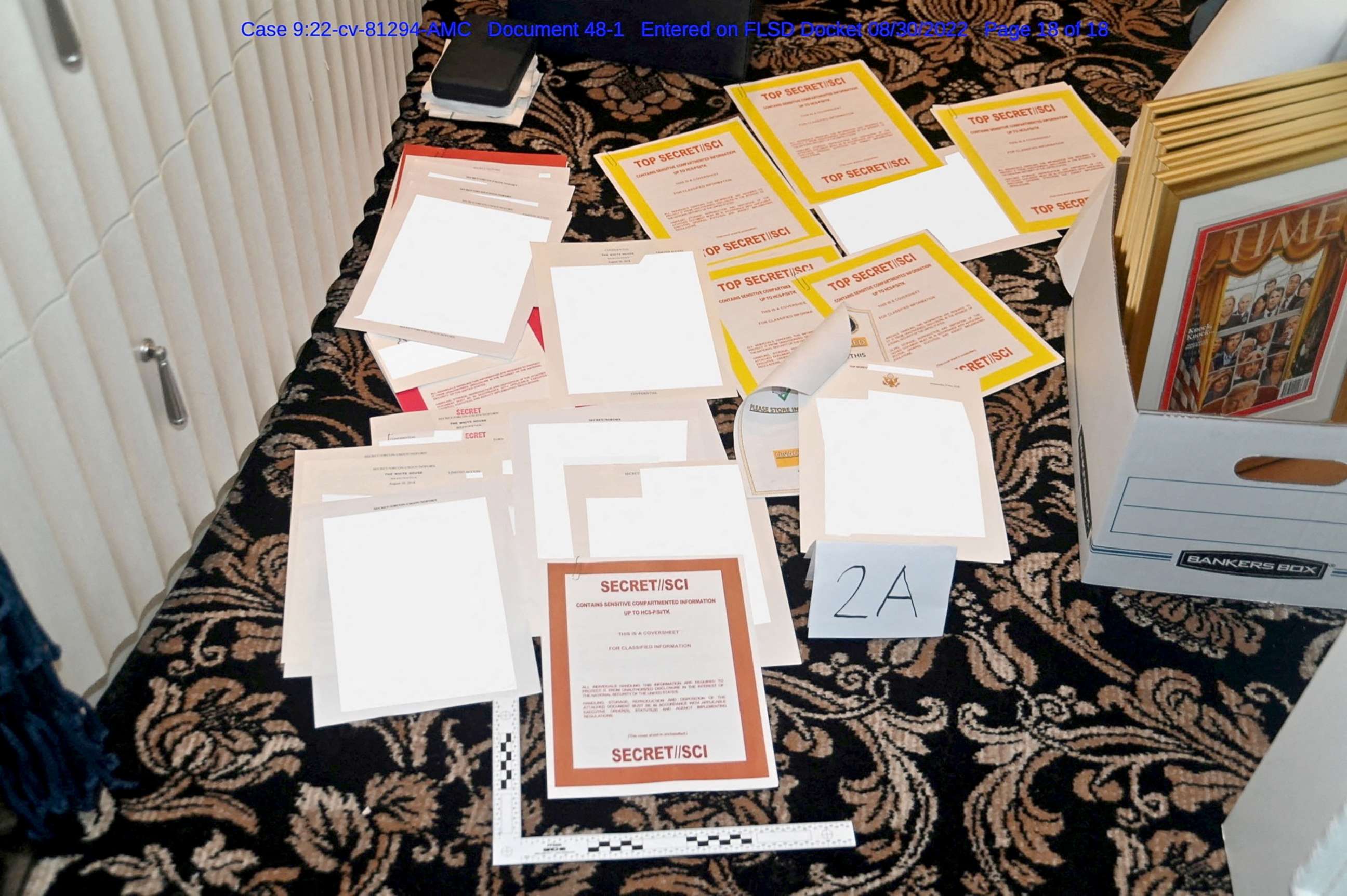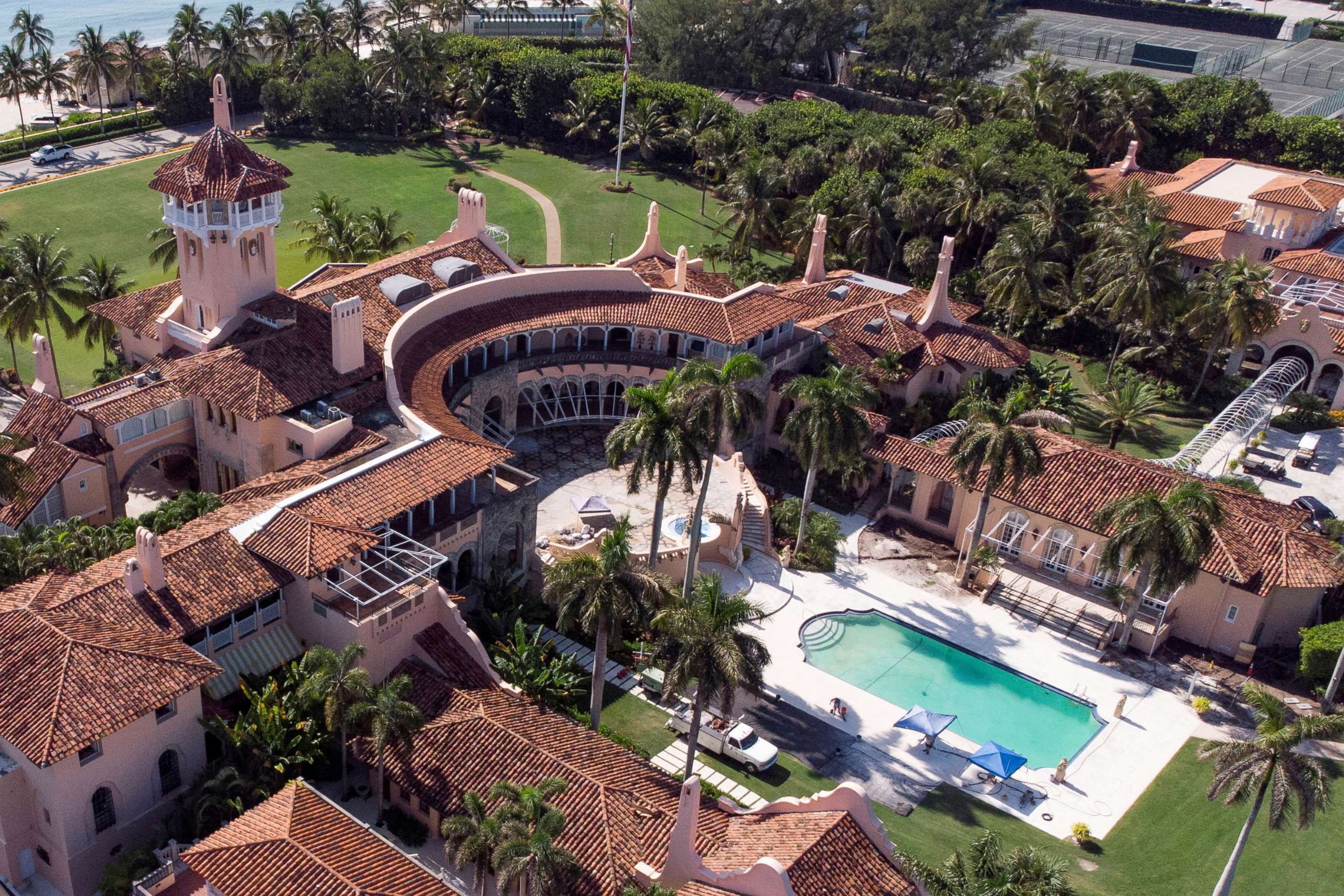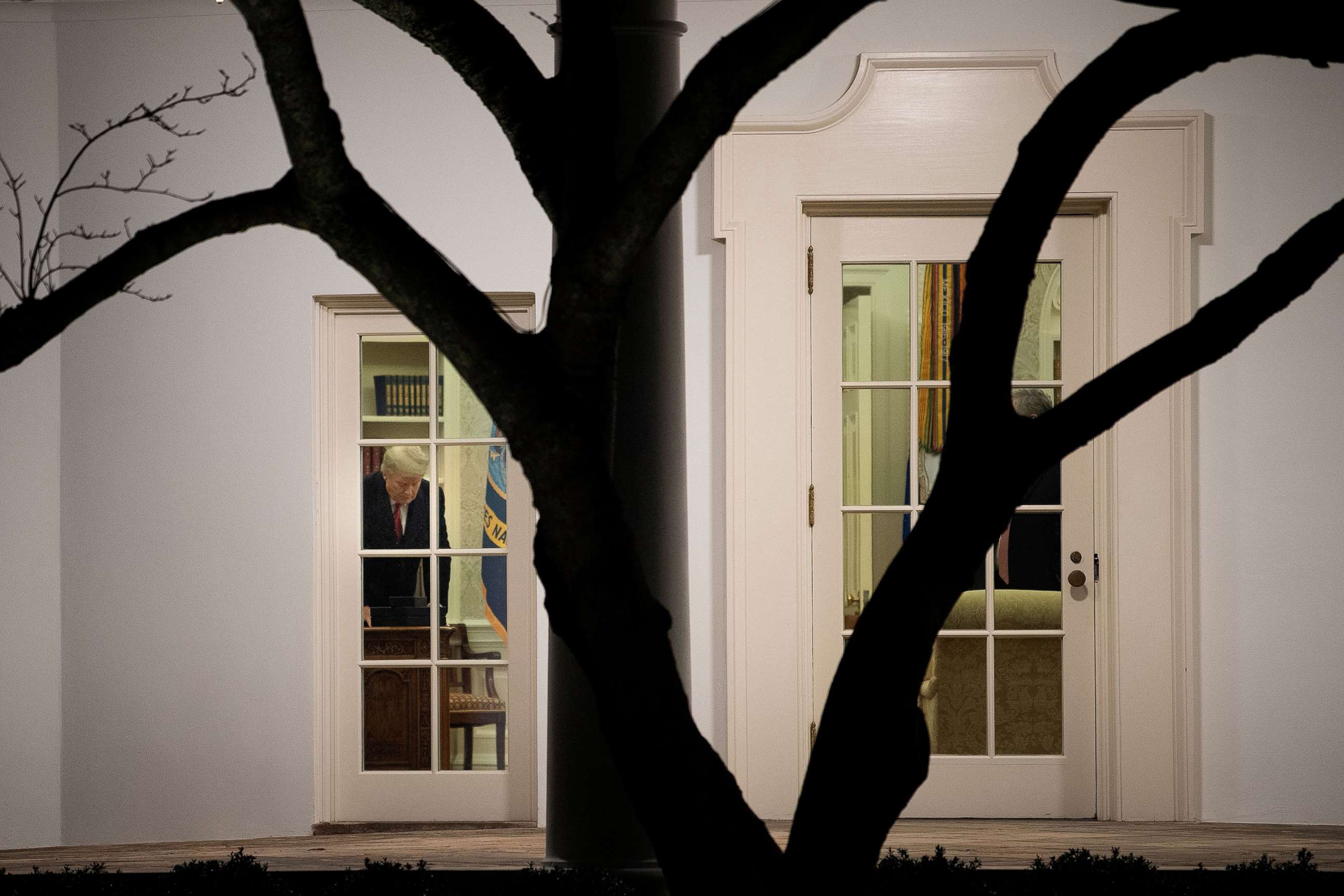On Trump's last day in office, why were sensitive documents allegedly in such disarray?
The DOJ said it couldn't tell which documents were classified.
At the end of Donald Trump’s presidency, his team returned a large batch of classified FBI documents and other government records to the Justice Department in such disarray that a year later -- in a letter to lawmakers -- the department said it still couldn’t tell which of the documents were the classified ones.
The documents came from the FBI’s controversial probe in 2016 looking at alleged links between Russia and Trump's presidential campaign. Trump tried to make the documents public the night before he left office, issuing a “declassification” memo and secretly meeting with conservative writer John Solomon, who was allowed to review the documents, Solomon told ABC News this past week.
But for reasons that are still not clear – and to the great frustration of Trump and his political allies – none of the documents were ever officially released, and the Justice Department said Thursday it's still working to determine which documents can be disclosed.
“[T]he Justice Department has ... failed to declassify a single page," Sens. Charles Grassley, R-Iowa, and Ron Johnson, R-Wisc., complained to the attorney general in February.
Much of what happened with the documents in those last days of the Trump administration -- and ever since -- remains shrouded in mystery because current and former government officials involved have refused to speak about it, especially now that the FBI is pursuing its investigation into Trump’s alleged mishandling of a separate cache of classified documents.

The story that still emerges, though, from pieces of public statements and Solomon’s own accounts is one that sheds further light on how Trump’s White House treated certain government secrets. And it helps explain how – in the midst of the FBI probe – Solomon became one of Trump’s official “representatives” to the National Archives.
'Thank God' for Solomon
By the middle of Trump’s presidency, Solomon had become one of Trump’s favorite voices in media.
"John Solomon should get the Pulitzer Prize," Trump said to cheers at a rally in Louisiana in October 2019.
At the time, Solomon was promoting a series of since-discredited claims about supposed Obama-era corruption in Ukraine, claims which Trump then privately pushed the Ukrainian president to investigate, leading to Trump's first impeachment.
Solomon's own employer then, The Hill newspaper, eventually launched an internal review and concluded his Ukraine-related pieces "potentially blurred the distinction between news and opinion" and at times failed to include relevant "context and/or disclosure[s]." Solomon has stood by those pieces, insisting still that they were accurate.
His work at the time was also focused on the FBI’s Russia-related investigation and its offshoots, which he described as "a sin against Donald Trump," an "offense against the entire American people," and “arguably the most devious political dirty trick in American history.”
"Thank God we have [Solomon and several Fox News hosts] on our side," Trump declared at the 2019 rally.
So when Trump and his team were determined to push out the so-called "full story" of "the Russia hoax" before Trump's presidency ended, Solomon was well-positioned to help, with his online media platforms and regular TV appearances.
"We worked closely together in trying to get to the truth on that," Solomon recounted to Trump’s former chief of staff, Mark Meadows, in an interview with him last year.

In its final report on the investigation, the Justice Department’s internal watchdog said that while it found “fundamental errors” and significant “failures” in the FBI probe, it found no evidence that “political bias or improper motivation influenced” the investigation, including the decision to eavesdrop on one of Trump’s former campaign advisers.
But Trump and many of his allies contended otherwise.
'Continuing objection'
With just weeks left as president, Trump "demanded" that "key documents" – still classified by the FBI and Justice Department – “be brought to the White House” so they could be “entered into the public record once and for all,” Meadows wrote in a memoir published last year.
On Dec. 30, 2020, the Justice Department delivered a binder filled with internal notes, memos, emails and other records. The White House was unsure of what should be disclosed, so Trump’s team asked a group of Republican staffers on the House Intelligence Committee to make recommendations, a congressional source informed of the request told ABC News.
“[It’s] a foot-and-a-half of documents, almost everything that the FBI had left out of public sight,” Solomon said in an interview with a right-wing website on Jan. 14, 2021, predicting that the documents could be “made public as early as tomorrow.”
But the FBI objected to "any" release at all, Trump’s "declassification" memo said.
"The FBI has concerns about everything, from the protection of assets and codenames, and prior investigations that may be referenced in the Russia materials, to Privacy Act stuff," Solomon said in an interview with another right-wing website on Jan. 18, 2021. "There’s been a lot of back and forth."
The FBI even sent a letter to the White House identifying passages in documents that were particularly "crucial to keep from public disclosure," the subsequent memo said.
Trump then agreed to some redactions, declaring that everything else in the binder was declassified, according to the memo.
“I personally went through every page, to make sure that the President’s declassification would not inadvertently disclose sources and methods,” Meadows wrote in his book.
It’s unclear if the FBI and Justice Department ever agreed with the review Meadows conducted.

Around that time, White House staffers produced multiple copies of documents from the binder, a former Trump administration official told ABC News.
'All the documents'
Trump formally issued his “declassification” memo regarding those documents at around 7 p.m. ET on his last full day in office, Jan. 19, 2021, the same day Solomon allegedly met with him.
"I had a brief interview with President Trump in which he told me unequivocally he had signed the order completing the [declassification] and that I would be getting a set of the declassified documents to post online for the public," Solomon told ABC News in a statement this past week. "Later that same day, I was allowed, on two occasions, to briefly review a stack of documents that I was told were the declassified documents. I wasn't allowed to keep the documents either time, but was told I would get a full set later in the day."
Shortly after 9 p.m. ET that day, Solomon appeared on Fox News and said he had "been through all the documents at least one time now."
He told ABC News the documents he reviewed had redactions, cross-outs and other “markings on them indicating they had been declassified” – though at least some of them were not stamped “declassified,” as formally-declassified documents often are.
Nevertheless, on the same day Solomon met with Trump and reviewed the documents, the Justice Department and U.S. intelligence community "were trying to get the documents back" from the White House,” Solomon said in a subsequent interview on Fox Business Network.
Several people at the White House "were fearful that something was going to happen to the larger batch," so they took steps to get at least "some of the documents" to Solomon, he said in a separate interview on Newsmax TV last September.
That night, a "courier" or staffer he didn’t know delivered a package to his Washington, D.C., office with a "small batch" of the documents in it, he told ABC News.
The envelope carrying the documents had the Justice Department insignia on it, he said.
Meadows did not respond to questions from ABC News, and the Justice Department declined to comment for this article.
'Bombshell revelations?'
Just before his Fox News appearance the night of Jan. 19, 2021, Solomon published a piece online revealing the "First Trump declassified Russia document," which he told ABC News came in the package he received.
The document was an FBI report detailing two September 2017 interviews with Christopher Steele, the former British spy whose "dossier" -- much of it since debunked -- was used to separately convince four federal judges that the FBI should be allowed to eavesdrop on a former Trump campaign adviser.
"There are some bombshell revelations," Solomon said of the FBI report on Fox News.
Despite such rhetoric, it’s unclear how much new information the documents could actually reveal about any FBI missteps or alleged bias in 2016.

Meadows claimed in his book that "several key papers" could "unravel the full story of how the United States intelligence community had targeted President Trump, spied on his campaign, and attempted to bring him down."
And on Fox News that night, Solomon called the FBI report "the most important of all the documents."
As Solomon touted it at the time, the FBI report supposedly revealed that Steele viewed Trump as his "main opponent," that he was worried Trump would hurt the U.S.-U.K. relationship, and that he leaked information about Trump and the FBI to the media because of Hillary Clinton’s ongoing email scandal during the 2016 campaign.
But records with that same information had been released by Senate Republicans seven weeks earlier and mentioned in the Justice Department inspector general’s report two years earlier, which outlined Steele’s "bias against Trump" and questions about the credibility of Steele’s sources.
Next week, one of Steele’s primary sources, Igor Danchenko, is set to go on trial in Virginia for allegedly lying to the FBI about his own sources of information as the FBI was trying to vet Steele's "dossier." Danchenko has pleaded not guilty in the case.
'Proven challenging'
On the morning of Jan. 20, 2021 – with just two hours left before Joe Biden would become president – Meadows found himself racing to the White House to retrieve at least some of the documents, he recalled in his book. And in a memo to then-acting attorney general Jeffrey Rosen that morning, Meadows said he would be returning “the bulk of the binder” to the Justice Department.
According to the memo, which Solomon later obtained, and more recent statements from Meadows, the department raised last-minute concerns about "privacy” and “personal information.” So “out of an abundance of caution” the White House gave the documents back to the Justice Department “to do final redactions,” he said in an interview with Solomon last December.
The New York Times recently reported that the privacy concerns stemmed from years-old text messages between then-FBI agent Peter Strzok and his romantically-connected colleague Lisa Page, who in 2016 exchanged a series of anti-Trump sentiments as they worked on the Russia-related probe.
Meadows said he expected that when the "final redactions" were completed, the documents would be released.
But that never happened.
“[D]etermining precisely what was declassified by [Trump] has proven challenging given the manner in which the relevant records were returned to the Department on January 20, 2021,” the Justice Department wrote Grassley and Johnson earlier this year, after they repeatedly expressed concern that none of the documents had been released. “The Department has been taking steps to determine what material is appropriately and lawfully disclosable.”
The National Archives also received a batch of related documents, which were similarly delivered in a not “easily discernible manner,” Solomon quoted the National Archives as telling him.
Efforts by ABC News to understand why at least two separate tranches of documents were allegedly both in such disarray were not successful.
Meanwhile, Meadows allegedly kept copies of at least some of those documents himself after leaving government.

In a newly-released book, New York Times reporter Maggie Haberman said Trump told her in an interview last year, months after leaving the White House, that Meadows still had "in his possession" the internal FBI text messages between Strzok and Page that Trump planned to make public on his last night in office.
"[Trump] offered to connect me with him," Haberman wrote.
As for Solomon, he told ABC News he never received the full set of documents Trump promised him.
The conservative group Judicial Watch recently filed a lawsuit asking a federal judge to force the Justice Department to release all of the document
In a court filing Thursday, the department said it is now "processing" 815 pages relevant to Judicial Watch's request and expects to start releasing "non-exempt records" in late December.
It's unclear if the Biden administration may have reclassified any of the documents that Trump previously declared as "declassified."
'A records dispute?'
In June, Trump announced he had designated Solomon and a former Trump administration official, Kash Patel, as his official representatives to the National Archives.
By then, a federal grand jury was already weeks into its investigation of Trump’s alleged refusal to return sensitive government documents to the National Archives and his alleged mishandling of national security documents at Mar-a-Lago.
When the FBI then sought approval from a judge to raid Mar-a-Lago, it noted – among many other things – that Patel publicly claimed Trump had already "declassified the materials at issue." The next two-and-a-half pages of the FBI's submission to the judge were completely redacted.
In a recent interview on Fox News, Trump made a series of widely-disputed claims about a president's authority to declassify information.
"If you’re the president of the United States, you can declassify ... [just] by thinking about it," Trump said. "So when you send it, it’s declassified. I declassified everything."

After the raid at Mar-a-Lago, Solomon issued a statement insisting his role as Trump’s representative to the National Archives "has nothing to do with the [FBI] investigation."
He was acting "as a reporter in an effort to resolve the question of what happened to the Russia probe documents that former President Trump declassified but which were never released," he said.
Solomon has denounced the FBI investigation as the "criminalization of a records dispute."
According to the Justice Department, hundreds of documents marked classified, including many marked “top secret,” were kept in unsecure locations at Mar-a-Lago after Trump left office. And a federal appeals court recently noted that, with respect to documents found during the raid, Trump has offered “no evidence that any of these records were declassified.”



